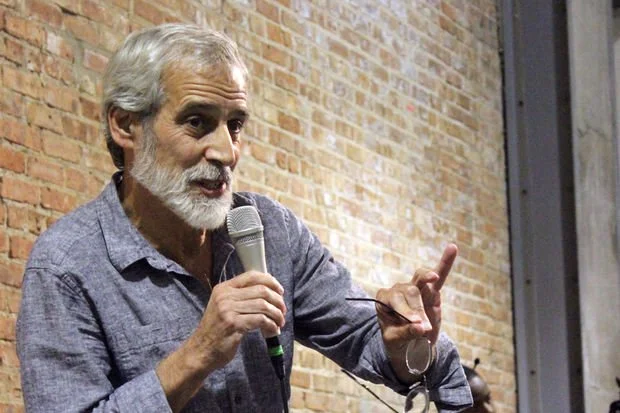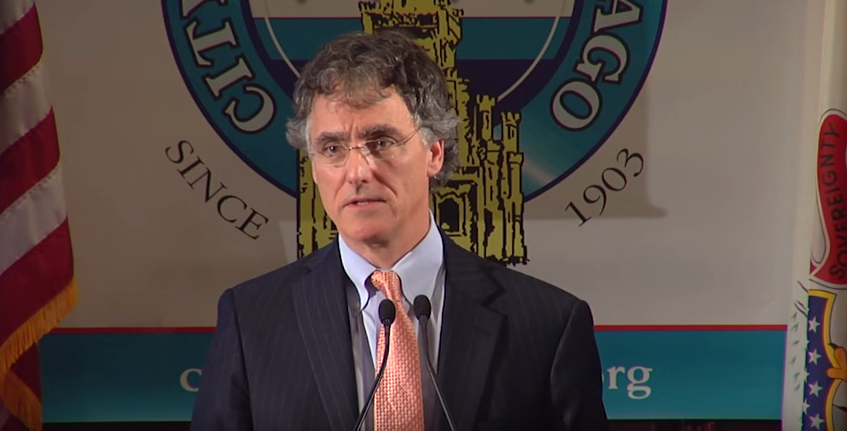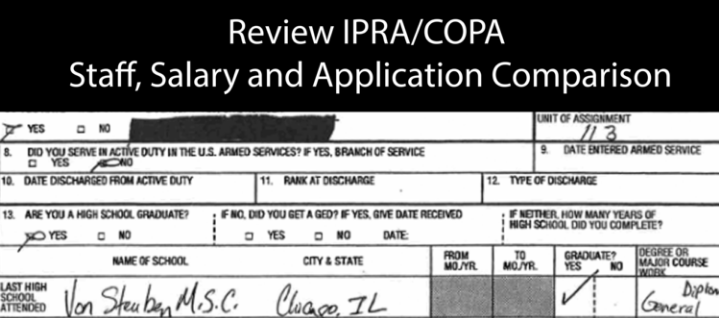Vol. 2, Issue 19: Diagnosing the "Underlying Problem"
At Issue: Chicago Police Records Released
Long-time observers were “shocked” by the “sheer number of complaints” as the city released five decades of police misconduct records last week, the Chicago Tribune reported. Of more than 125,000 complaints filed against roughly 25,000 officers from 1967 to 2014, nearly 90 percent were dismissed as unsustained or unfounded, according to the Tribune’s analysis. (An analysis of part of the data by the Chicago Sun-Times yielded somewhat different numbers.) Where wrongdoing was found, “firing officers was exceedingly rare,” the Tribune reported. While nearly half of CPD officers had no complaints against them, seven had over 100, and 62 had more than 70.
“If the police department is truly interested in identifying problem officers, then the clusters of complaints seem to be an obvious place to look,” attorney Jon Loevy told the Tribune.
Jon Loevy, center (YouTube)
Topping the list of officers with complaints was Jerome Finnigan, the alleged ringleader of a robbery ring in the now-disbanded Special Operations Section, who had 157 complaints—far more than previously known. According to the Sun-Times, which analyzed data from 1967 to 2001, Finnigan was never disciplined. He is currently serving a 12-year federal sentence for a murder-for-hire scheme and tax evasion. State charges against Finnigan and other SOS officers for robbery, kidnapping, and home invasion are still pending.
The city provided a searchable spreadsheet for complaints from 1967 to 2001, but complaints from 2001 to 2014 were released in a 7,000-page PDF file, making analysis more difficult, the Sun-Times reported. The released information does not include badge numbers; demographic data for officers, complainants, and subjects; or beat numbers and other geographic information, according to an analyst at the Invisible Institute. The institute has a more detailed FOIA request pending.
Jamie Kalven of the Invisible Institute called the release “a big deal.” “This is precisely the information we need to diagnose the underlying problems and pathologies in the police department,” he told WBEZ.
Jamie Kalven (Sam Cholke/DNAinfo Chicago)
DESK DUTY: Two former Special Operations Section officers still under investigation by the police department remain on paid desk duty—ten years after the SOS scandal came to light, the Chicago Tribune reports.
In 2009, State’s Attorney Anita Alvarez dropped charges, including robbery, kidnapping, and home invasion, against Officers Thomas Sherry and Carl Suchocki. They were stripped of their police powers and placed on paid desk duty a decade ago pending a series of investigations. A CPD internal investigation is still ongoing, according to the Tribune.
The two officers have spent the longest period on desk duty among the 85 officers barred from working the streets due to ongoing disciplinary cases, the Tribune reports. While the Independent Police Review Authority has been criticized for inefficiency in investigations, a greater number of officers on desk duty are under investigation by the department’s Bureau of Internal Affairs, where cases can also take years to resolve.
WHISTLEBLOWER LAWSUIT: Underscoring recent revelations of a “code of silence” that extends far beyond the police department’s rank-and-file, Officer Jaeho Jung, a ten-year CPD veteran, filed a whistleblower lawsuit last week, alleging that he faced retaliation after reporting officers for filing false reports and other misconduct to his sergeant.
(More on last week’s Code of Silence story can be found on WBEZ’s Morning Edition and ProPublica’s podcast.)
FETAL COPS: A CPD member being honored for bravery denied that the department has “gone fetal,” referencing a phrase used by Mayor Emanuel last year. “Everyone in the city who thinks that we’ve gone fetal, or that the police have gone fetal, don’t believe it for a second,” Officer Antonio Herrera said at the Chicago Police Memorial Foundation’s annual Valor Lunch.
WAR ON POLICE: A veteran Chicago-area officer, Louis Hayes Jr., notes that police deaths have been declining since the mid-1970s. However, he argues that the constant messaging that police are under attack creates a climate of fear among officers, which can lead to the rapid escalation of confrontations.
Hayes calls for an “overhaul” of police training, stating that it “spends too much time on exceptions and not enough on rules.” He advocates for greater emphasis on “slow-down strategies,” implicit bias training, and community outreach.
BAIL’S TOO HIGH: Some 92 percent of Cook County Jail inmates are awaiting trial because they cannot afford bail, ABC7 reports. Some have been waiting for years.
Max Suchar of the Chicago Community Bond Fund tells ABC that the average bond hearing lasts just 37 seconds. The fund advocates for the elimination of money bonds.
Cook County Sheriff Tom Dart is backing legislation that would allow the sheriff to seek bail reductions. His office states that judges are not uniformly following recommendations from a new assessment system designed to identify nonviolent suspects who qualify for release pending trial.
Sheriff Tom Dart (YouTube)
Meanwhile, Zachary Robinson and Michael Lewis, two indigent County Jail inmates, have filed a class action lawsuit on behalf of all individuals “who have been determined to be eligible for release but who are detained solely because they cannot afford to post the required amount of bail.”
BODY CAMERAS: Chicago used a highly unusual approach—“piggybacking” on a New Jersey contract—to bypass standard competitive bidding and sign a five-year, $10 million contract with Taser International to outfit CPD members with body cameras, according to the Chicago Reporter. However, the deal could effectively lock CPD into using Taser’s cloud storage software indefinitely.
The Atlantic cites Chicago’s experience in an article questioning whether body cameras will become “another fancy technology” that “often doesn’t seem to work at the most crucial moments.”
COPA STAFF: The city’s 2017 budget allocates 141 employees for the new Civilian Office of Police Accountability, a 45 percent increase over the number of positions currently budgeted for the Independent Police Review Authority, the Sun-Times reports.
The IPRA Tracker, a crowdsourced tool produced by City Bureau and the Invisible Institute, recently added information on COPA and IPRA salaries. This includes IPRA job applications obtained through the Freedom of Information Act, a link to 15 job postings for COPA posted by the city of Chicago, and a full list of IPRA salaries as of mid-October. The IPRA Tracker also provides information, full text, and crowdsourced annotations on ordinances related to police investigative organizations in Chicago.
DOJ FORUM: The U.S. Justice Department has scheduled a fifth hearing as part of its investigation into CPD on Monday, October 24, at 6:30 p.m. at Malcolm X College, 1900 W. Jackson.




